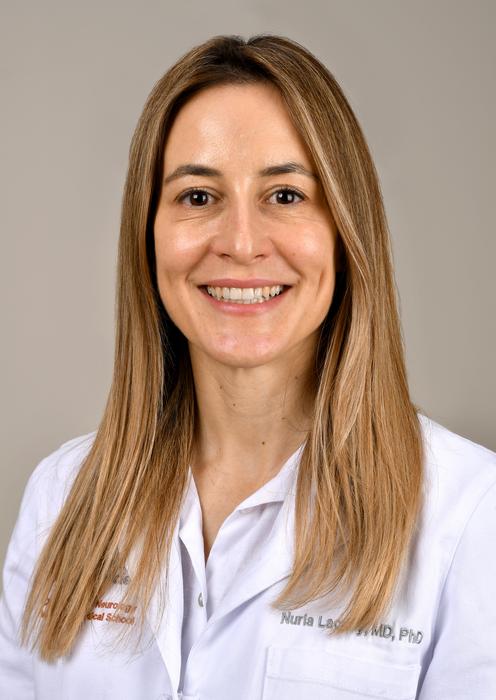A five-year, $3.1 million grant to study preventive strategies for sudden unexpected death in epilepsy (SUDEP) has been awarded to UTHealth Houston by the National Institutes of Health (NIH) National Institute of Neurological Disorders and Stroke.

Credit: Dwight Andrews/UTHealth Houston
A five-year, $3.1 million grant to study preventive strategies for sudden unexpected death in epilepsy (SUDEP) has been awarded to UTHealth Houston by the National Institutes of Health (NIH) National Institute of Neurological Disorders and Stroke.
Nuria Lacuey Lecumberri, MD, PhD, associate professor in the Department of Neurology with McGovern Medical School at UTHealth Houston, is principal investigator of the study, which builds upon her years of research analyzing breathing during epileptic seizures and the localization of brain areas involved in breathing regulation.
SUDEP is a devastating complication of epilepsy and a leading cause of premature death in patients with chronic uncontrolled epilepsy. Most attacks occur after a generalized convulsive seizure that leads to respiratory arrest, and patients are typically found in bed, lying flat on their stomachs. Yet, despite the major impact on life expectancy in these patients, no targeted SUDEP preventive strategies currently exist. It occurs more often in patients ages 21 to 40 compared to other age groups, according to the Centers for Disease Control and Prevention.
“The purpose of this research is to increase the understanding of brain respiratory control with the goal of using neuromodulation to enhance respiration after generalized convulsive seizures,” said Lacuey, who sees patients at UTHealth Houston Neurosciences. “Identification of respiratory brain sites capable of stimulation-driven breathing enhancement will help us develop new and innovative neuromodulation approaches for ambulatory SUDEP prevention.”
Most SUDEP is due to post-convulsive central apnea, according to previous research that analyzed patients who died while being monitored in hospital epilepsy units. Crucially, a three-minute post-convulsive “window of opportunity” was identified, beyond which the deadly cascade of respiratory and cardiac failure takes place.
By advancing current understanding of forebrain breathing networks, Lacuey believes her team can develop neuromodulatory, or nerve-stimulating, strategies for respiratory facilitation and apnea rescue that may prevent SUDEP during this critical time window.
They hope to gain a better understanding of forebrain modulation of breathing by using anatomically precise, intracranial stereotactic electroencephalography (SEEG) data that can determine optimal stimulation paradigms to enhance breathing.
The translational impact of these results will set the stage for larger scale clinical trials of breathing modulation as potential anti-SUDEP therapy, using central apnea to trigger responsive neurostimulation in people who are at higher risk of SUDEP. This work will also provide insights into potential treatment of central apnea associated with other diseases, such as Parkinson’s and Alzheimer’s diseases, obesity, heart failure, and stroke.
“Any SUDEP prevention strategy requires successful rescue from such respiratory arrest during this critical time window, and unfortunately, there are no effective strategies for SUDEP prevention,” Lacuey said. “This project identifies neuromodulation approaches for respiratory rescue that will aid in the design of SUDEP preventive interventions.”
The research is funded by NIH Grant No. R01NS133743. UTHealth Houston investigators contributing to the project include Samden Lhatoo, MD; Sandipan Pati, MD; John Mosher, PhD; and Yuri Dabaghian, PhD, all with McGovern Medical School, and Xi Luo, PhD, with UTHealth Houston School of Public Health.




